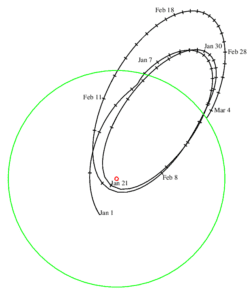
Edinburgh, 27 January 2022. – SpaceX launched its first interplanetary mission in February 2015 and after having travelled too far to have enough fuel to return to Earth or to escape the gravity of the Earth-Moon system, the spacecraft stayed on a chaotic orbit. According to sky observers, the defunct Falcon 9 second stage is now going to impact the Moon.
Falcon 9’s second stage delivered the National Oceanic and Atmospheric Administration’s Deep Space Climate Observatory to a Lagrange point. After seven years spent in between the Earth and its satellite, the spacecraft is finally due to touch down.
Bill Gray, developer of the Project Pluto software that tracks near-Earth objects, says the impact could happen in March. According to the data, Falcon 9’s upper stage will impact the far side of the Moon, near the equator. As the spacecraft is tumbling in space however, further observations are needed to define the precise time and location.
Satellites currently orbiting the Moon will then be able to observe the impact crater. Subsurface material ejected by the encounter with the four-metric-ton second stage could provide valuable selenological data. The spacecraft will crash into the atmosphereless Moon at a velocity of about 2.58 km/s.
 SpaceWatch.Global An independent perspective on space
SpaceWatch.Global An independent perspective on space




